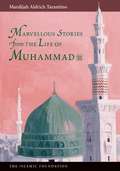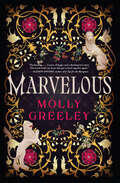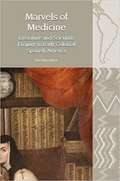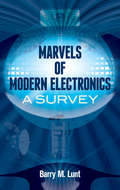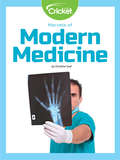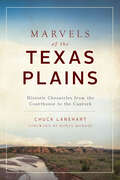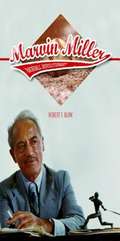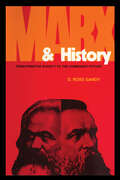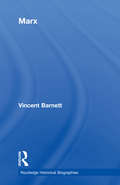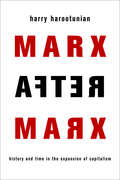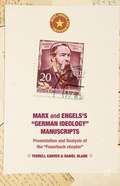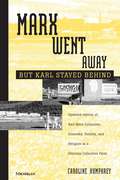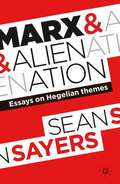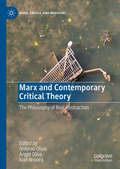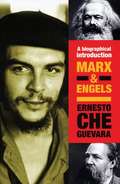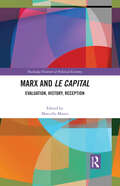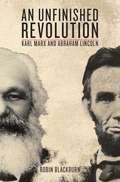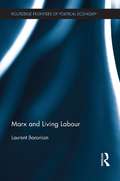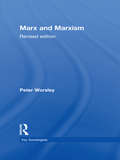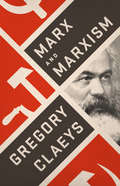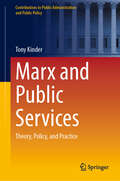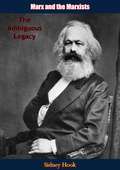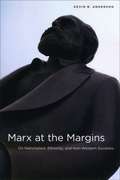- Table View
- List View
Marvelous Stories from the Life of Muhammad
by Mardijah Aldrich TarantinoThis book is a collection of eighteen lively, well-loved stories from the life of the Prophet Muhammad. They highlight the main stations of his life--from orphaned child to Prophet of God and beloved leader of all Muslims. The book includes twenty-three charming illustrations that offer a glimpse of the world in which the stories are set. Mardijah Aldrich Tarantino is of American and French heritage. She has traveled widely and enjoys painting, languages, and writing for children. She lives in Cathedral City, California.
Marvelous: A Novel
by Molly Greeley"Enchanting. Molly Greeley has pulled off a piece of magic to tell a dazzling love story about the outcast's ache to be cared for and belong. This book broke my heart and put it back together again."--Allison Epstein, author of A Tip for the Hangman"A richly detailed and imaginative novel. Readers will relish Greeley's emotionally potent tale."--BooklistA mesmerizing novel set in the French royal court of Catherine de’ Medici during the Renaissance, which recreates the touching and surprising true story behind the Beauty and the Beast legend, from the acclaimed author of The Clergyman’s Wife and The Heiress. 1547: Pedro Gonzales, a young boy living on the island of Tenerife, understands that he is different from the other children in his village. He is mercilessly ridiculed for the hair covering his body from head to toe. When he is kidnapped off the beach near his home, he finds himself delivered by a slave broker into the dangerous and glamorous world of France’s royal court. There “Monsieur Sauvage,” as he is known, learns French, literature, and sword fighting, becoming an attendant to the French King Henri II and a particular favorite of his queen, the formidable Catherine de’ Medici. Queen Catherine considers herself a collector of unusual people and is fascinated by Pedro…and determined to find him a bride.Catherine Raffelin is a beautiful seventeen-year-old girl whose merchant father has fallen on hard times and offers up his daughter to Queen Catherine. The queen will pay his debts, and his daughter will marry Monsieur Sauvage.Catherine meets Pedro for the first time on their wedding day. Barely recovered from the shock of her father’s betrayal, she soon finds herself christened “Madame Sauvage” by the royal courtiers, and must learn to navigate this strange new world, and the unusual man who is now her husband.Gorgeously written, heartbreaking and hopeful, Marvelous is the portrait of a marriage, the story of a remarkable, resilient family, and an unforgettable reimaging of one of the world’s most beloved fairy tales.
Marvels of Medicine: Literature and Scientific Enquiry in Early Colonial Spanish America (Liverpool Latin American Studies)
by Yarí Pérez MarínMarvels of Medicine makes a compelling case for including sixteenth century medical and surgical writing in the critical frameworks we now use to think about a genealogy of cultural expression in Latin America. Focusing on a small group of practitioners who differed in their levels of training, but who shared the common experience of having left Spain to join colonial societies in the making, this book analyses the paths their texts charted to attitudes and political positions that would come to characterize a criollo mode of enunciation. Unlike the accounts of first explorers, which sought to amaze audiences back in Europe with descriptions of strange and astonishing lands, these texts instead engaged the marvellous in an effort to supersede it, stressing the value of sensorial experience and of verifying information thorough repetition and demonstration. Vernacular medical writing became an unlikely early platform for a new form of regionally-anchored discourse that demanded participation in a global intellectual conversation, yet found itself increasingly relegated to the margins. In responding to that challenge, anatomical treatises, natural histories and surgical manuals exceeded the bounds set by earlier templates becoming rich, hybrid narratives that were as concerned with science as with portraying the lives and sensibilities of women and men in early colonial Mexico.
Marvels of Modern Electronics: A Survey
by Barry LuntThis scintillating survey of the major electronic discoveries of the past century -- including static electricity, vacuum tubes, transistors, and television -- focuses on the past forty years of technological innovation. Learn what's "under the hood" of computers, integrated circuits, the Internet, cell phones, GPS, optical fibers, space probes, and other modern wonders. Engaging and mildly technical, this authoritative treatment can be understood by anyone with a high school education and an interest in technology.A brief history of electronics is succeeded by explorations of developments in electrical safety, radar, and deep-space probes. Additional topics include the operation of computers, data storage, and optical fiber communications as well as the electronics behind automobiles and consumer devices. The first four chapters provide background, and the following self-contained chapters may be read in any order. Author Barry M. Lunt, a Professor of Information Technology at Brigham Young University, also provides forecasts for upcoming directions in electronics.
Marvels of Modern Medicine
by Christine GrafIn medicine, machines can be used to take detailed pictures of bones and even to save people’s lives. Read on to learn about the marvelous machines of modern medicine, like the defibrillator, the x-ray machine, and more!
Marvels of the Texas Plains: Historic Chronicles from the Courthouse to the Caprock
by Chuck LanehartAssemble a composite portrait of the Texas plains through these historic tales.Many thousands of years ago, Clovis Man hunted huge mammoths here. More recently, Waylon Jennings drew his musical inspiration here. In the intervening time, the Texas prairie has been the backdrop for the wildest of Wild West shootouts, landmark legal battles and epic achievements in sports, music and medicine. Familiar icons like Roy Orbison and Dan Blocker, as well as forgotten characters like Charlie "Squirrel-Eye" Emory and John "the Catfish Kid" Gough all helped shape the colorful history of the Texas Plains. Who shot the sheriff? Who was the earliest American? Who invented the slam dunk? Author Chuck Lanehart answers these questions and many more in a wide-ranging collection of stories.
Marvin Miller, Baseball Revolutionary (Sport and Society)
by Robert F BurkMarvin Miller changed major league baseball and the business of sports. Drawing on research and interviews with Miller and others, Marvin Miller, Baseball Revolutionary offers the first biography covering the pivotal labor leader's entire life and career. Baseball historian Robert F. Burk follows Miller's formative encounters with Depression-era hard times, racial and religious bigotry, and bare-knuckle Washington politics to a successful career in labor that prepared Miller for his biggest professional challenge--running the moribund Major League Baseball Players Association. Educating and uniting the players as a workforce, Miller embarked on a long campaign to win the concessions that defined his legacy: decent workplace conditions, a pension system, outside mediation of player grievances and salary disputes, a system of profit sharing, and the long-sought dismantling of the reserve clause that opened the door to free agency. Through it all, allies and adversaries alike praised Miller's hardnosed attitude, work ethic, and honesty. Comprehensive and illuminating, Marvin Miller, Baseball Revolutionary tells the inside story of a time of change in sports and labor relations, and of the contentious process that gave athletes in baseball and across the sporting world a powerful voice in their own games.
Marx & History: From Primitive Society to the Communist Future
by D. Ross Gandy&“Gandy has attempted a much-needed reinterpretation of Marx&’s theory of history—one that, everything considered, deserves the reader&’s attention.&” —American Political Science Review In this book Karl Marx&’s observations on history, which are found scattered throughout his voluminous writings, are brought together and subjected to searching analysis—in refreshingly direct language, without jargon. For the first time we have a thoughtful assessment of Marx&’s views on all the epochs that cross his historical vision. D. Ross Gandy treats Marx&’s ideas on primitive societies, on ancient Roman and Asiatic civilization, on the structure of feudalism, on strategies for overthrowing capitalism, and on the hypothetical communist future. Among the author&’s departures from traditional readings of Marx are his interpretations of class struggle, his conception of social strata, and his cogent analysis of the &“new Marxism.&” Since many aspects of Marxist historical theory have been neglected or distorted, Gandy&’s remarkably clear commentary, based on extensive research—including an exhaustive study of the forty-volume Marx-Engels Werke—will doubtless stimulate debate among sociologists and other students of social change, political scientists, and historians.
Marx (Routledge Historical Biographies)
by Vincent BarnettKarl Marx has been portrayed in equal measure both as a political prophet who foresaw the end of capitalist exploitation, and as a populist Anti- Christ whose totalitarian legacy has cost millions of lives worldwide. This new biography looks beyond these caricatures in order to understand more about the real Karl Marx; about his everyday life and personal circumstances as well as his political ideology. The book tells the life story of a man of ideas, showing how his political and economic thought developed alongside his life and practical work. Vincent Barnett seeks to paint Karl Marx not as a static, unwavering character, but as a man whose beliefs developed dynamically over time. The book explores his personal background, and problems of personal income and family health. It also examines the influence of Hegel's methods on Marx's work, and his relationship with Engels. This lively, up to date guide to the life of Karl Marx provides an excellent starting point for students in history, politics and philosophy, and for all those with an interest in Marxism and political ideas.
Marx (The Routledge Philosophers)
by Brian Leiter Jaime EdwardsThe writings of Karl Marx (1818–1883) have left an indelible mark not only on the understanding of economics and political thought but on the lives of millions of people who lived in regimes that claimed (wrongly) his influence. Trained as a philosopher and steeped in the thought of Hegel, Marx turned away from Hegelian philosophy after 1845 towards a philosophy that incorporated economics and history. It is this Marx that endures and to which this outstanding introduction is devoted.Jaime Edwards and Brian Leiter begin with an overview of Marx's life and intellectual development, including his early years as a journalist in Germany before his exile in London. They then introduce and assess the fundamental elements of Marx’s thought: Marx’s theory of history and historical change (historical materialism) class conflict, the state, and the Communist revolution Marx’s theory of economics, especially the labour theory of value, and his prediction of the collapse of capitalism the nature and role of ideology in Marx’s thought Marx’s theory of human nature and the good life, including his arguments concerning alienation Marx’s legacy and influence, including Western Marxism, the Frankfurt School, and “feminist Marxism”. Including annotated further reading suggestions at the end of each chapter and a glossary of technical terms, this is an indispensable introduction to Marx's philosophical thought. It will also be extremely useful to those in related disciplines such as politics, sociology, history, and political economy.
Marx After Marx: History and Time in the Expansion of Capitalism
by Harry HarootunianIn Marx After Marx, Harry Harootunian questions the claims of Western Marxism and its presumption of the final completion of capitalism. If this shift in Marxism reflected the recognition that the expected revolutions were not forthcoming in the years before World War II, its Cold War afterlife helped to both unify the West in its struggle with the Soviet Union and bolster the belief that capitalism remained dominant in the contest over progress. This book deprovincializes Marx and the West's cultural turn by returning to the theorist's earlier explanations of capital's origins and development, which followed a trajectory beyond Euro-America to Asia, Africa, and Latin America. Marx's expansive view shows how local circumstances, time, and culture intervened to reshape capital's system of production in these regions. His outline of a diversified global capitalism was much more robust than was his sketch of the English experience in Capital and helps explain the disparate routes that evolved during the twentieth century. Engaging with the texts of Lenin, Luxemburg, Gramsci, and other pivotal theorists, Harootunian strips contemporary Marxism of its cultural preoccupation by reasserting the deep relevance of history.
Marx And Engels’s "german Ideology" Manuscripts
by Terrell Carver Daniel BlankThis work presents a wholly original translation and philosophical analysis of the two authors' rough work in the so-called 'Feuerbach' chapter.
Marx Went Away - But Karl Stayed Behind: Economy, Society and Religion in a Siberian Collective Farm
by Caroline HumphreyWhen it appeared in 1983, Caroline Humphrey's Karl Marx Collective was the first detailed study of the Soviet collective farm system. Through careful ethnographic work on two collective farms operated in Buryat communities in Siberia, the author presented an absorbing--if dispiriting--account of the actual functioning of a planned economy at the local level. Now this classic work is back in print in a revised edition that adds new material from the author's most recent research in the former Soviet Union. In two new chapters she documents what has happened to the two farms in the collapsing Russian economy. She finds that collective farms are still the dominant agricultural forms, not out of nostalgic sentiment or loyalty to the Soviet ideal, but from economic and political necessity. Today the collectives are based on households and small groups coming together out of choice. There have been important resurgences in "traditional" thinking about kinship, genealogy, shamanism and mountain cults; and yet all of this is newly formed by its attempt to deal with post-Soviet realities.
Marx and Alienation
by Sean SayersThe concepts of alienation and its overcoming are central to Marx's thought. They underpin his critique of capitalism and his vision of future society. Marx's ideas are explained in rigorous and clear terms. They are situated in the context of the Hegelian ideas that inspired them and put into dialogue with contemporary debates.
Marx and Contemporary Critical Theory: The Philosophy of Real Abstraction (Marx, Engels, and Marxisms)
by Antonio Oliva Ángel Oliva Iván NovaraThis edited volume brings together an international and interdisciplinary group of scholars to explore the traces of the idea of “Real Abstraction” in Marx’s thought from the early to late writings, as well as the theoretical and practical consequences of this notion in the capitalist social system. Divided into two main parts, Part One reconstructs Marx’s notion of “Real Abstraction” and the influences of earlier thinkers (Berkley, Petty, Franklin, Feuerbach, Hegel) on his thoughts, as well as the further elaborations of this concept in later Marxist thinkers (Sohn-Rethel, Lukács, Lefebvre, Adorno and Postone). Part Two then considers the reverberations of the notion in the field of critical theory from a more abstract critique of capitalist social relations, to a more concrete understanding of historical movements. Taken together, the chapters in this volume offer a focused look at the concept of “Real Abstraction” in Marx.
Marx and Engels: A Biographical Introduction
by Ernesto Che GuevaraThis Che Guevara book makes an insightful contribution to the revival of interest in Marxism. Commenting on Marx's humanism, Che writes: "Such a humane man, whose capacity for affection extended to all those suffering throughout the world."
Marx and Le Capital: Evaluation, History, Reception (Routledge Frontiers of Political Economy)
by Marcello MustoOver the past few years, Marx’s Capital has received renewed academic and popular attention. This volume is dedicated to the history of the making, the theoretical evaluation, and the analysis of the dissemination and reception of an almost unknown version of Capital: the French translation, published between 1872 and 1875, to which Marx participated directly. In revising this version, Marx decided to introduce some additions and modifications, not hesitating to describe in the postscript Le Capital as ‘a scientific value independent of the original’. To mark the 150th anniversary of the French translation of Capital (1872-2022), 15 authors have helped to shed light on its history and main features, as well as analysing its later fortunes in France and in the rest of the world. They also provide a more exhaustive account of the ideas of the "late" Marx. The book also includes a previously unpublished selection of 31 letters from correspondence of Karl Marx, Maurice Lachâtre, Just Vernouillet and Friedrich Engels related to the making of Le Capital. 10 of these letters by Marx were only recently rediscovered and are translated here for the first time in English. This book is an indispensable source for academic communities who are increasingly interested in rediscovering Marx beyond 20th century Marxism. Moreover, it will be of appeal to graduate students, as well as established scholars, interested in French socialism and the history of the labour movement.
Marx and Lincoln: An Unfinished Revolution
by Abraham Lincoln Karl Marx Robin BlackburnKarl Marx and Abraham Lincoln exchanged letters at the end of the Civil War. Although they were divided by far more than the Atlantic Ocean, they agreed on the cause of free labor and the urgent need to end slavery. In his introduction, Robin Blackburn argues that Lincoln's response signaled the importance of the German American community and the role of the international communists in opposing European recognition of the Confederacy. The ideals of communism, voiced through the International Working Men's Association, attracted many thousands of supporters throughout the US, and helped spread the demand for an eight-hour day. Blackburn shows how the IWA in America--born out of the Civil War--sought to radicalize Lincoln's unfinished revolution and to advance the rights of labor, uniting black and white, men and women, native and foreign-born. The International contributed to a profound critique of the capitalist robber barons who enriched themselves during and after the war, and it inspired an extraordinary series of strikes and class struggles in the postwar decades. In addition to a range of key texts and letters by both Lincoln and Marx, this book includes articles from the radical New York-based journal Woodhull and Claflin's Weekly, an extract from Thomas Fortune's classic work on racism Black and White, Frederick Engels on the progress of US labor in the 1880s, and Lucy Parson's speech at the founding of the Industrial Workers of the World.
Marx and Living Labour: Marx And Living Labour (Routledge Frontiers of Political Economy)
by Laurent BaronianFrom his early economic works on, Marx conceived the labour of any kind of society as a set of production activities and analysed the historical modes of production as specific ways of distributing and exchanging these activities. Political economy on the contrary considers the labour only under the form of its product, and the exchange of products as commodities as the unique form of social labour exchange. For Marx, insofar as the labour creating value represents a specific mode of exchanging the society's living labour, general and abstract labour cannot not only be defined as the substance or measure unit of the commodity, as in Smith or Ricardo, but foremost as an expense of living labour, i.e. of nerves, muscles, brain, etc. Hence the twofold nature of living labour, as a concrete activity producing a use value and an expense of human labour in general producing exchange value. Marx himself claimed that this twofold nature of labour creating value was its main and most important contribution to economic science. This book aims at showing how both determines the original categories and economic laws in Capital and constitutes the profound innerspring of Marx's critique of political economy. The role and function of living labour is highlighted by dealing with the difference between Marx and Classics' theories of labour value; money and the problems of its integration in economic analysis, especially in Keynes; the transition from feudalism to capitalism; the theory of capital through a discussion on the Cambridge controversy and the transformation problem; the labour process and the principles of labour management; unemployment and overpopulation; the formulas of capital in the history of economic thought; finally, an interpretation of the current crisis based on Marx's conception of overaccumulation and speculation after having distinguished it from underconsumption and stagnation theories of crises.
Marx and Marxism (Key Sociologists)
by Peter WorsleyKarl Marx probably had more influence on the political course of the last century than any other social thinker. There are many different kinds of Marxism, and the Twentieth Century saw two huge Marxist states in total opposition to one another. In the West, Marxism has never presented a revolutionary threat to the established order, though it has taken root as the major theoretical critique of capitalist society in intellectual circles, and new interpretations of Marx's thought appear each year.Peter Worsley discusses all these major varieties of Marxism, distinguishing between those ideas which remain valid, those which are contestable, and those which should now be discarded. Rather than treating Marxism purely as a philosophy in the abstract, he concentrates upon the uses to which Marxism has been put and emphasises the connections between the theoretical debates and political struggles in the real world.
Marx and Marxism (Pelican Bks.)
by Gregory ClaeysA new biography of Karl Marx, tracing the life of this titanic figure and the legacy of his workKarl Marx remains the most influential and controversial political thinker in history. He died quietly in 1883 and a mere eleven mourners attended his funeral, but a year later he was being hailed as "the Prophet himself" whose name and writings would "endure through the ages." He has been viewed as a philosopher, economist, historian, sociologist, political theorist, even a literary craftsman. But who was Marx? What informed his critiques of modern society? And how are we to understand his legacy?In Marx and Marxism, Gregory Claeys, a leading historian of socialism, offers a wide-ranging, accessible account of Marx's ideas and their development, from the nineteenth century through the Russian Revolution to the present. After the collapse of the Soviet Union his reputation seemed utterly eclipsed, but now a new generation is reading and discovering Marx in the wake of the recurrent financial crises, growing social inequality, and an increasing sense of the injustice and destructiveness of capitalism. Both his critique of capitalism and his vision of the future speak across the centuries to our times, even if the questions he poses are more difficult to answer than ever.
Marx and Public Services: Theory, Policy, and Practice (Contributions to Public Administration and Public Policy)
by Tony KinderBy evaluating previous public management research through Marxist concepts, this textbook offers innovative solutions to public service problems. It updates Marx’s framework to reflect the growth of public services, transitioning from abstract state notions to concrete service analysis. Addressing two critical gaps, the book highlights the benefits of a Marxist approach to public services and presents Marxist ideas to examine these services at a micro level. It demonstrates the relevance of Marxist frameworks for public service professionals, critically reviews current public management knowledge, and sheds light on the dynamic nature of public services against the background of neoliberalism. While doing so, the book goes beyond a Eurocentric perspective, providing cases and practical examples from developed and developing countries, with an additional focus on Asian practices. Written by an award-winning author with years of practical experience and designed for graduate and advanced undergraduate students, each chapter sets clear learning objectives and reviews existing tools and frameworks. The chapters also present new ways of improving public services, encouraging readers to apply Marxist concepts to their contexts and cultures. This will also make this book a practical resource for practitioners and professionals, seeking to resolve their grounded public services issues.
Marx and Satan
by Richard WurmbrandThis book is a well-documented study of Marxism's roots in satanism.
Marx and the Marxists: The Ambiguous Legacy
by Sidney HookIn this work Sidney Hook, a distinguished scholar, examines the chief issues which have divided Marxists from non-Marxists, and Marxists from each other. This volume of exposition, comment and readings is offered as an introduction to the study of Marxism in conflicting theory and practice. A valuable collection of original source readings are provided, including "The Communist Manifesto", "Historical Materialism," "The Fetishism of Commodities," "Religion and Economics," and much more by Marx, Engels, Lenin, Stalin, Kautsky, Trotsky and Luxemburg.-Print ed.
Marx at the Margins: On Nationalism, Ethnicity, and Non-Western Societies
by Kevin B. AndersonAnalyzing a variety of Marx's writings, including journalistic work written for the New York Tribune, Anderson presents us with a Marx quite at odds with our conventional interpretations.
